|
|
|
Sort Order |
|
|
|
Items / Page
|
|
|
|
|
|
|
| Srl | Item |
| 1 |
ID:
143551
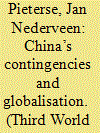

|
|
|
|
|
| Summary/Abstract |
Will China be able to rebalance its economy, heavily tilted towards investment? Will it be able to increase the share of household consumption in GDP? Will it turn steeply growing social inequality around? Will urbanisation contribute to China’s rebalancing or will it add to the imbalances? Will China manage to bring pollution under control? Such variables will determine whether China can move beyond the middle-income trap and also affect its external relations. In addition, China’s rebalancing is a variable in global rebalancing. This article provides an introduction to the special issue.
|
|
|
|
|
|
|
|
|
|
|
|
|
|
|
|
| 2 |
ID:
143556
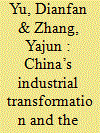

|
|
|
|
|
| Summary/Abstract |
China’s industrial transformation faces four big roadblocks: the loss of traditional comparative advantage, weak domestic demand, low-end locking of the value chain, and structural and institutional obstacles. The shift of economic growth to structural upgrades, innovation and a service-based economy is the primary driving force required. China should implement four strategies. The first is to cultivate a new dynamic comparative advantage and inject new vitality for industrial transformation. The second is to let the market play a more decisive role and establish a long-term mechanism to expand domestic demand. The third is to promote the convergent development of global and national value chains, upgrading the value chain in horizontal and vertical axes. The fourth is to create an upgraded version of Chinese reform, manage the market with a pattern of negative listing and supervise the government with a pattern of positive listing.
|
|
|
|
|
|
|
|
|
|
|
|
|
|
|
|
| 3 |
ID:
143554
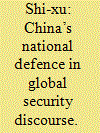

|
|
|
|
|
| Summary/Abstract |
China’s ascendancy in general and its military growth in particular have engendered mixed reactions the world over. This article takes up international academic discourse on China’s national defence and examines the ways in which recurring themes of China as a ‘regional threat’, ‘hostile East Asian power’, and as ‘untrustworthy’, as well as proposals of counter-strategies, are constructed in a case of an international journal publication. Proceeding from Cultural Discourse Studies (CDS), and especially the notion of rhetoric as morally oriented, the article shows that the ‘dangers’, ‘threats’ and ‘untrustworthiness’ of China are born, not out of presentations of facts or evidence, but out of particular rhetorical renderings of Western binary thinking and presumptions of ‘USA-as-guarantor-of-world-peace’ and ‘power-as-hegemony’. Further, it critiques from a CDS perspective the cultural bias and human consequences of these ways of thinking and speaking. The article ends with suggestions for culturally new ways of thinking and talking about the cultural Other and international relations more generally.
|
|
|
|
|
|
|
|
|
|
|
|
|
|
|
|
| 4 |
ID:
143552


|
|
|
|
|
| Summary/Abstract |
China’s reform and opening-up process has coincided with the expansion of globalisation. Many people have expressed the belief that China has been the biggest winner in globalisation, and some of them even believe that the country has begun to take initiatives in globalisation instead of merely being affected by it. This article reviews the foundations of China’s engagement with globalisation, and shows how Chinese scholars have approached the study of globalisation for the past three decades. By further examining the Chinese authorities’ official stance, China’s changing identity and newly announced strategic initiatives, the article argues that the relationship between China and globalisation has undergone a certain transition, in which the country has been increasing its power and will to reshape and engage the process of globalisation.
|
|
|
|
|
|
|
|
|
|
|
|
|
|
|
|
| 5 |
ID:
143557
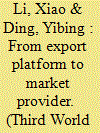

|
|
|
|
|
| Summary/Abstract |
Since the 1990s China’s development of a market-oriented economy and its engagement with globalisation have given it a role as the primary export platform of a globalised Asian economy. This has not only promoted the exports of capital and intermediate goods of the other leading Asian economies, but has also stabilised the fluctuations of the Asian economy and deepened the regional production networks in the US-dominated global economic system. As China is entering an economic ‘new normal’, its economic structure and growth pattern will experience a period of transition. Thus its role in the Asian economy and the global economic system will change. China’s new role as a market provider for the final consumer goods from the region might increase. China’s efforts to reform its domestic economy and develop regional economic cooperation arrangements will helpful in accomplishing this role change, but various uncertainties and contingencies might continue to pose obstacles for this process.
|
|
|
|
|
|
|
|
|
|
|
|
|
|
|
|
| 6 |
ID:
143555


|
|
|
|
|
| Summary/Abstract |
In the current Chinese and international cultural and theoretical context globalisation has been one of the most heatedly debated topics of the past decade. This raises these questions: why should we Chinese humanities scholars deal with this topic with such enthusiasm? Has China really benefited from globalisation in its modernity project? How is globalisation realised in the Chinese context? How has it affected China’s humanities and culture? The advent of globalisation in China is subject to various constructions and reconstructions in its glocalised practice. So it is actually a sort of glocalisation in the Chinese context. Based on my previous research and on others’ publications, I offer my own reconstruction of globalisation with regard to its ‘glocalised’ practice in China. In the age of globalisation modernity has taken on a new look, or become a postmodern modernity, characterised by contemporary consumer culture. Along with the rapid development of its economy, China is now experiencing a sort of ‘de-third-worldising’ process, with its function increasingly important in the world.
|
|
|
|
|
|
|
|
|
|
|
|
|
|
|
|
| 7 |
ID:
143559


|
|
|
|
|
| Summary/Abstract |
This article examines the applicability of convergence thinking via two protests in southern China: the Wukan ‘uprising’ and the ‘Umbrella Revolution’. These failed to usher in ‘democracy’ in an unnamed, ‘Western’ procedural sense. Yet the global media events expose the limits of convergence thinking, both official/PRC and Western/liberal. In so far as convergence is also about hegemony and rivalry, the events also show the fading of the latter, liberal one and the rise of the Chinese state as something which must be reckoned with analytically. It is not that the Chinese version is truer but that its relative legitimacy and actuality must be used to further citizens’ ends. The challenge is to re-politicise the state and bureaucracy, and in this the villagers have a lesson for Hong Kong.
|
|
|
|
|
|
|
|
|
|
|
|
|
|
|
|
| 8 |
ID:
143560
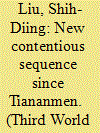

|
|
|
|
|
| Summary/Abstract |
In the aftermath of the crackdown in Tiananmen, China’s political landscape has witnessed a new protest cycle. Unrest has escalated as a consequence of the reconfiguration of the Party-state, which has to deal with an increasingly restive society. The protest politics since the 1990s has unfolded with a set of distinctively different patterns, dynamics and consequences alongside with the transformation of the Party-state. This paper gives an account of the emerging new contentious sequence, with an emphasis on how the transformation of the Party-state has facilitated the conditions for popular resistance. The distinctiveness of the new sequence rests in the ambivalent relationship and strategic engagement with the decentralised Party-state, which has increasingly accommodated mass protest to recapture regime legitimacy. Profound changes in state governance and state–society linkages, the central–local divide, as well as the socialist tradition have all combined to reshape the conditions for contemporary popular struggle in China.
|
|
|
|
|
|
|
|
|
|
|
|
|
|
|
|
| 9 |
ID:
143553
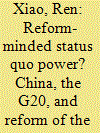

|
|
|
|
|
| Summary/Abstract |
This paper analyses the case of China in the G20 process and examines China’s position and policies on relevant issues, including international monetary system reform, reform of the international financial institutions (IFIs), international financial regulation, the future of the dollar, and internationalisation of the renminbi. My findings demonstrate that China has actively participated in the G20’s deliberations and actions, put forward its suggestions, sought an expanded share and voting power in the IFIs in correspondence with its rising status, and promoted the internationalisation of the renminbi. It does not aspire to overthrow this system within which it has prospered. In this sense China is a status quo power. Meanwhile China argues that the current international order is flawed and that there exist a number of unjust and unreasonable components. They have long needed to be changed. My conclusion is that China is not a complete but rather a reform-minded status quo power.
|
|
|
|
|
|
|
|
|
|
|
|
|
|
|
|
| 10 |
ID:
143562


|
|
|
|
|
| Summary/Abstract |
Under a strongly entrenched and powerful regime since the Han Dynasty, China has formed a unique ‘state-lead, church-follow’ model, in which the secular regime always incorporates religious affairs into its national administration. The Chinese Communist Party’s religious policy has largely remained an inheritance of the practice dating back to ancient times. In response to the great ‘religious awakening’ in the age of reform, especially the political risks that religion was seen to pose after the downfall of the USSR and the disintegration of the Communist bloc in Eastern Europe, the Party proposed a policy of ‘management of religious affairs according to law’. This ‘self-centred’ policy is being challenged, yet is crucial to social and political stability.
|
|
|
|
|
|
|
|
|
|
|
|
|
|
|
|
| 11 |
ID:
143558


|
|
|
|
|
| Summary/Abstract |
One of the most important arguments with which China has sought to develop amicable relations with its neighbours has been the promise of economic benefits. Yet, this paper argues, these gains have remained limited. In spite of limited available data, the paper shows that China’s contribution to the rest of Asia’s GDP has been small and for most neighbours negative. Moreover, China is increasingly impelling those countries into partnerships that look unequal rather than equal. While Beijing has tried to mitigate frustration by promising to rebalance its economy and to create more export opportunities, the paper goes on to reveal that China is in fact readying itself to make another major push for exports itself and to pursue its own open-door policy.
|
|
|
|
|
|
|
|
|
|
|
|
|
|
|
|
| 12 |
ID:
143561
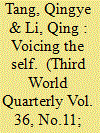

|
|
|
|
|
| Summary/Abstract |
This study, drawing upon J. R. Martin’s appraisal theory, examines the discursive representations of self in a corpus of in-depth interviews with 15 Chinese old-generation migrant workers. Migrants represent self as aliens, outlanders, the suppressed and socially excluded, but with strong self-awareness and a definite self-categorisation. This study has implications for removing the stigma and stereotype against this group and enhancing their power of discourse. Also, with the voice being heard, the marginalised have the opportunity to resist forced identity and to contribute to building a bridge of sympathy, empathy, respect and understanding between the powerful and the powerless.
|
|
|
|
|
|
|
|
|
|
|
|
|
|
|
|
|
|
|
|
|